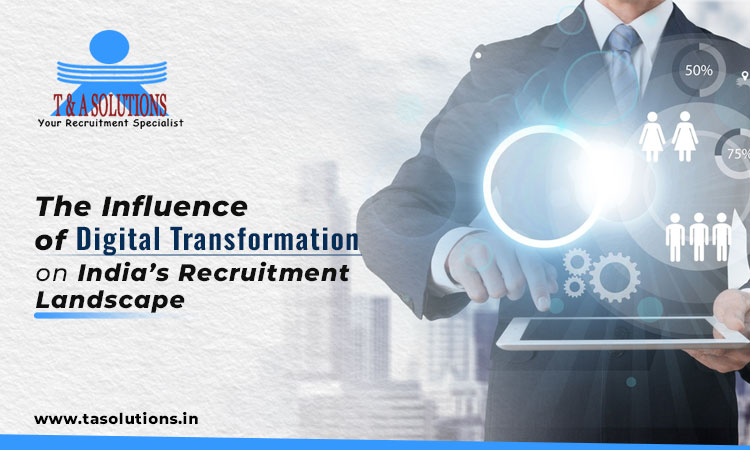
When the entire globe is whole-heartedly embracing digital transformation to alter the dimension of recruitment and attracting potential skills, India has not lagged. The digital revolution and the ‘Digital India’ campaign of the Indian government are instrumental in allowing India to open up boundless job opportunities in front of skilled individuals. In India, the placement services in Gurgaon are aimed at building up a multi-faceted and diverse workforce instead of merely creating contacts from varied job portals.
Gurgaon over the past 15 years has turned into a major IT hub after undergoing a huge transformation. Due to that reason, the organizations of Gurgaon are in dire need of hiring a versatile workforce that can adapt to the new environment. In this blog, we are going to dive deep into the impact of digital transformation on India’s recruitment industry. Get ready to explore now.
The Indian recruitment industry is evolving at a lightning-fast pace and enabling the hiring managers to stay in touch with the recent trends for making innovative hiring practices. As per the recent statistical data in June 2024, the hiring activity in India rose by 12% and it’s a clear impact of digital transformation that takes part in addressing the unemployment issues. On the other hand, AI and automation are being leveraged by 75% of recruitment agencies in India to streamline candidate sourcing, screening, and initial interviews. In addition to that, 90% of companies are using data analytics to make informed decisions about talent acquisition strategies and predict future needs of hiring. 95% of companies in India are stressing creating a positive experience for candidates throughout the recruitment process. From this scenario of hiring in India, the established organizations and the startups can assume that investment in the placement agencies in Gurgaon is the wisest decision that can aid in reaping long-term financial and non-financial benefits.
The Indian recruitment landscape is rapidly changing. It is getting the potential from ongoing digital transformation, spearheaded by AI, IoT, Data analytics and others. As organizations are diving into the digital age, recruitment agencies and consultancies are adapting to meet the new demands of job seekers and employers. Plus, they are presenting custom solutions for the redressal of pressing challenges.
Forget the hassles of shortlisting the right ones from the piles of resumes. The best recruitment consultancy in Gurgaon is utilizing online job boards, social media, and professional networking sites. Owing to these practices, recruiters are now free to connect with potential candidates in a snap. And this means they can cast a wider net and find exactly what they need without the hassle.
The process of sorting through hundreds of resumes can be a drag. Here AI comes into play. Recruiters at a recruitment consultancy in Gurgaon are presently relying on AI and machine learning to automate the initial screening process. These smart systems can filter resumes based on specific criteria, helping recruiters find the best candidates without spending hours on them.
Although we can never forget the negative impact of the pandemic on us, we can still thank it. Pandemic turned remote working into a new reality. Digital platforms allow recruiters, including placement agencies in Gurgaon, to conduct virtual interviews and assess candidates’ skills, no matter where they are. This flexibility opens up a world of possibilities for both recruiters and job seekers. So, now you have the opportunity to get the best talents from any corner of the world without the worry of geographical borders.
None likes doing administrative tasks manually as it is extremely time-consuming. But the arrival of AI in the Indian landscape has simplified the journey, and that’s why the placement agencies and recruiters offering placement services in Gurgaon are effortlessly conducting tasks like document management and background checks with the assistance of automation.
The hiring landscape of India now is shaped by the preponderance of AI tools and flexible norms that are making the screening to onboarding of the candidates a breeze.
As businesses are proceeding towards complete automation, IT and sales have occupied the first and foremost positions and demands in these roles are quite high in comparison to the others.
Digital transformation is enabling recruiters to reach a wider audience, to identify candidates with specific skill sets more efficiently, and to conduct virtual interviews and skills assessments. It is saving both time and money.
Digital transformation in India is not about making the hiring process fast and forward, but rather creating a superior experience for all who are associated with it. And let’s not forget about the long-term impact as this transformation is preparing the Indian recruitment industry to become more resilient and flexible. In turn, you can expect that job seekers and employers later on will have more scopes. The placement services in Gurgaon are expected to create a more inclusive talent ecosystem in future and lead over the other regions of the country and beyond.

In a globalized world, as it is, the words diversity and inclusion are in no way mere buzzwords but critical parts of a thriving, creative, and competitive workplace. For Indian companies, nurturing an inclusive workplace culture is crucial in winning top talent and driving business success. This article aims to offer practical ways through which HR professionals, business owners, and recruitment agencies in Chandigarh can develop diversity and inclusion in their organizations.

Despite the strides that have been made by many Indian firms concerning making their work environment more diverse as well as inclusive, there is still much to be done. Progress often stalls due to traditional prejudices, societal norms, and a lack of awareness. Nevertheless, forward-thinking companies appreciate the significance of diversity hence actively working towards breaking down such barriers.
In India including recruitment agencies in Chandigarh, there is a need for unbiased recruitment practices that will ensure a diversified candidate pool. Blind recruitment tools can help minimize biases against applicants by eliminating candidates’ personal details from resumes. Moreover, having clear objective criteria for promotion ensures all employees have equal opportunities to develop themselves.
An inclusive workplace depends on policies that encourage inclusivity that includes flexible work options and anti-discrimination policies. At the same time initiatives like cultural diversity days’ celebrations among others also create employee resource groups fostering a sense of belongingness across various backgrounds.
Training programs on diversity have vital roles to play because it helps people get knowledge about inclusivity within them thus raising awareness among employees about its importance within a wider society setting where different cultures coexist together with each other. Those training experiences should focus on unconscious bias issues among other things. Moreover, by having regular workshops and seminars to ensure that this conversation continues, then employees will constantly be learning.
An inclusive workplace truly values different points of view and also allows employees to express their original ideas. This can be done by ensuring that all the voices are listened to during meetings thereby promoting diversity and teams. In addition, respect for others’ ideas through open dialogue is a way of getting more innovative results thus improving business outcomes.
Some Indian companies are leading in the aspect of diversity and inclusion. Tata Consultancy Services (TCS), for example, has implemented robust diversity programs including women in leadership initiatives, and benefits for disabled employees among others. Infosys too has made considerable progress with its comprehensive diversity training as well as inclusive hiring practices.
A diverse and inclusive workplace offers numerous benefits such as:
• Increased creativity and innovation
• Better decision-making
• Enhanced employee engagement and retention
• Improved company reputation
• Greater access to a broader talent pool
To conclude, both ethical and commercial reasons make sure that diversity is promoted throughout various workplaces in India. For instance, unbiased recruitment policies would create a more inclusive workforce if implemented across our organization, where we find an inclusive culture plus staff programs on appreciating differences.
So next time you think of moving a step ahead of your diversity and inclusiveness journey, seek a partnership with placement services in Chandigarh and specialize in creating diverse talent pipelines. Start today and build a workplace that welcomes everyone alike.
Are you interested in making your office contribute to a more inclusive society? Contact placement services in Chandigarh about transformation immediately. Let’s create a tomorrow where diversity and inclusion are at the core of all organizations.
A1: This is because it promotes an environment at work where each employee feels valued. They assist with innovation, decision-making, engagement, or even retention of workers. In addition to enhancing business outcomes, people from different backgrounds within an inclusive as well as diverse workforce bring unique perspectives which lead to inventive solutions.
A2: Companies should begin employing measures that ensure all candidates for positions are evaluated without any type of bias; such measures include blind recruitment among others. They should also specify measurable criteria for candidate evaluation explicitly including HR training professionals or recruitment agencies in Chandigarh who need such sessions on diversity management skills continuous improvement through the provision of other talents by cooperating with mixed talent-seeking agencies may be extremely crucial too.
A3: The most effective teaching sessions must address issues such as unconscious biases, cultural awareness, non-discriminatory language, etc. This can however be done through workshops, seminars, and e-learning platforms. Furthermore, there are always ongoing activities like periodic conversation refreshers which help maintain organizational relevance because inclusivity is valuable that should be preserved and learned forever.